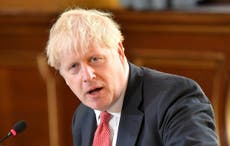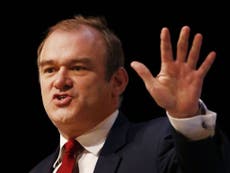Your support helps us to tell the story
From reproductive rights to climate change to Big Tech, The Independent is on the ground when the story is developing. Whether it's investigating the financials of Elon Musk's pro-Trump PAC or producing our latest documentary, 'The A Word', which shines a light on the American women fighting for reproductive rights, we know how important it is to parse out the facts from the messaging.
At such a critical moment in US history, we need reporters on the ground. Your donation allows us to keep sending journalists to speak to both sides of the story.
The Independent is trusted by Americans across the entire political spectrum. And unlike many other quality news outlets, we choose not to lock Americans out of our reporting and analysis with paywalls. We believe quality journalism should be available to everyone, paid for by those who can afford it.
Your support makes all the difference.Britain will walk out of Brexit talks if there is no deal agreed by the middle of October, Boris Johnson has announced — raising the chance that the UK will crash out of the single market with nothing to replace it.
Speaking ahead of yet another round of negotiations in London, the prime minister said there was “no sense in thinking about timelines that go beyond” a planned EU summit on 15 October because any further delay would mean an agreement was not in place by the end of the year.
“If we can’t agree by then, then I do not see that there will be a free trade agreement between us, and we should both accept that and move on,” Mr Johnson said — in his first major Brexit intervention since the start of negotiations in the spring.
It comes after The Independent reported that the European Parliament does not believe talks can continue past October because of the need for the rest of the year to ratify a deal.
Mr Johnson’s chief negotiator David Frost, who was recently promoted to Lord Frost, said at the weekend that he believed that “EU's stance may, realistically, limit the progress we can make next week”. EU sources have also expressed pessimism and said the UK needs to move if there is to be a deal.
Ireland’s foreign minister Simon Coveney also warned this weekend that the UK’s “emotional” nationalism, which he said was guiding the British strategy, could lead to a no-deal.
After next week’s round, talks are expected to continue in Brussels on the week beginning 28 September October, with a possible further round in October before the planned European Council summit in Brussels.
Mr Johnson claimed that a no-deal would be a “good outcome” for the UK and said the government was “preparing, at our borders and at our ports, to be ready for it” — despite a warning from the freight industry that the UK risked border chaos.
But he raised the prospect of so-called "side deals” that could potentially smooth over some of the worst immediate economic consequences of a no-deal.
“We will of course always be ready to talk to our EU friends even in these circumstances,” he said.
“We will be ready to find sensible accommodations on practical issues such as flights, lorry transport, or scientific cooperation, if the EU wants to do that. Our door will never be closed and we will trade as friends and partners — but without a free trade agreement.
“There is still an agreement to be had. We will continue to work hard in September to achieve it. It is one based on our reasonable proposal for a standard free trade agreement like the one the EU has agreed with Canada and so many others.
“Even at this late stage, if the EU are ready to rethink their current positions and agree this I will be delighted. But we cannot and will not compromise on the fundamentals of what it means to be an independent country to get it.”
Very little actual progress has been made since negotiations on trade kicked off in the spring. Officials on both sides say the coronavirus crisis has deflected political attention elsewhere and made it more difficult to make the major political calls needed to come to a compromise.
Major sticking points remaining include the issue of EU fishing fleet access to UK waters, the extent of UK alignment to EU standards and regulations, and the overall legal governance of the deal.
But it is specifically the issue of whether Britain will follow EU state aid rules that has proved the most contentious, amid reports that Boris Johnson wants to the UK to be able to support its own national champion industries.




Join our commenting forum
Join thought-provoking conversations, follow other Independent readers and see their replies
Comments